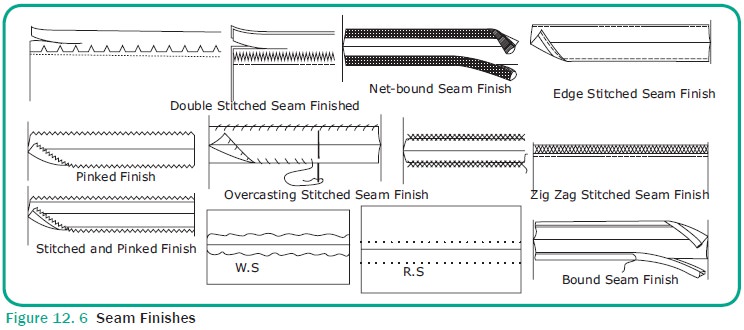Sewing - Seam Finishes and Types of Seam Finishing | 11th Textiles and Dress Designing : Chapter 12 : Basic Sewing
Chapter: 11th Textiles and Dress Designing : Chapter 12 : Basic Sewing
Seam Finishes and Types of Seam Finishing
Seam Finishes
Seams have raw edges which tend to ravel out. Therefore the raw edge of seams are finished by different methods like double stitching over cast stitching, herring bone stitch, hem stitching, zig-zag stitch and bound finish.
Types of Seam Finishing
When joining two pieces of fabric with a seam its
raw edges must also be taken care. They must not ravel or create a fuzzy look.
Hence seam finishes play an important role in acquiring a neat com-pleted
garment. Seam can be finished by different methods (Figure 12.6). The most
common methods are discussed below.

Double Stitched Seam
Double stitched seam is done by sewing another or
a second row stitches about 0.25 cm away from the original seam. This can be a
straight or a zig zag stitch. This seam is done on curled material where
travelling of the seam is higher. Example:
Knitted Jersey.
Pinked Finish
Pinked finish is given by cutting the edges of
the seams with pinking shears. This is a simple and easy method. It does not
involve more time, but it is not suitable for material which tend to ravel
easily. Example: Satin.
Stitched and Pinked Seam
Stitched and pinked seam is a simple seam. First
the fabrics are joined by a row of stitches. Then the raw edges are trimmed
using pinking shears. This seam finish is not suitable for seams which ravel
easily.
Herring Bone Seam Finish
Herring bone seam finish is done by fold-ing the
raw edges flat on the dress and working a row of herring bone stitches. This
finish is very neat since the raw edges are not visible. It is suitable for
heavy materials. Example: Men’s coat
Hem Stitched Seam Finish
Hem stitched seam finish is similar to her-ring
bone seam finish. In this finish the raw edges are folded and pressed toward
the dress and a row of hem stitch is done. This looks very neat because only
small dotted line is seen on the right side.
Overcast Seam Finish
Overcast seam finish is a finish which is
suitable for both thick and thin fabrics, which fray easily. It can be used for
seam along the armscye, yoke lines and even in hem lines. A plain seam is made
first. Then the raw edges are completed sepa-rately with overcast stitches.
Edge Stitched Seam Finish
In edge stitched seam finish, the raw edges are
pressed open and folded for 0.5 cm down and a row of top stitch is done on both
raw edges without attaching it to the dress. This seam gives a neat look. Due
to its thickness it is not suitable for curved edges.
Zig-zag Seam Finish
Zig zag seam finish is done by holding both the
edges of the seam together and making a row of zig zag stitch. It is best
suitable for fur material.
Bound Seam Finish
Bound seam finish is done by stitching around the
open seam on the wrong side. The stitch is made along the seam line, with wider
side of the tape underneath. This seam is best suitable for finish-ing seams on
unlined coats and sports jackets.
Net-Bound Seam Finish
Nylon or a netted strip of fabric is placed near
the raw edges of the seam in such a manner that the nylon fabric is slightly
off-center. The nylon material is firmly folded covering the seam and sewed.
Net bound seam finish is best suitable for thin delicate fabrics, like velvet
and chiffon.
Related Topics